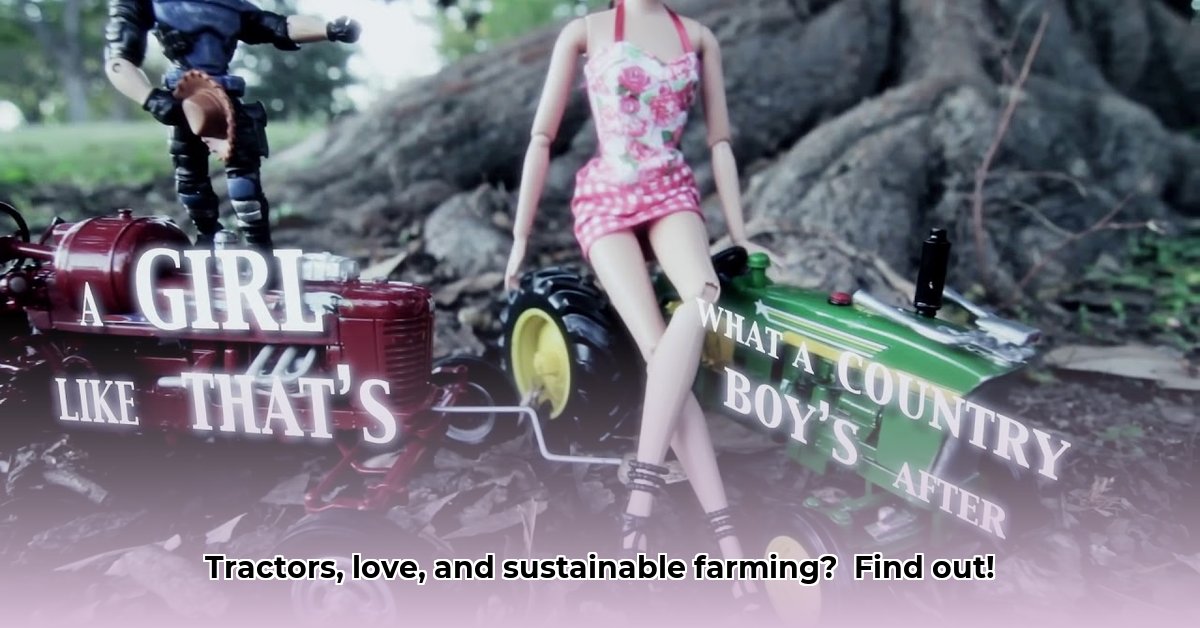
Kenny Chesney's "She Thinks My Tractor's Sexy" – a seemingly simple country tune – offers a surprisingly insightful lens through which to examine the future of sustainable agriculture. The song's romanticized portrayal of rural life, centered around the powerful image of a tractor, begs the question: Can this idealized vision of farming coexist with the urgent need for environmentally responsible practices? This article delves into the lyrics, exploring the complexities of balancing tradition with innovation in the pursuit of a sustainable food system. For more on agricultural supplies, check out tractor supply resources.
She Loves My Tractor Lyrics: A Surprisingly Relevant Tune?
The seemingly innocuous lyrics of Chesney's hit single unexpectedly resonate with broader conversations surrounding sustainable farming. The song's catchy melody paints a picture of idyllic rural life, a life many find alluring. However, this romanticized image clashes with the very real challenges facing modern agriculture. The tractor, a central symbol in the song, represents both the power and the potential pitfalls of conventional farming. While essential for efficient food production, many tractors rely on fossil fuels, contributing to climate change. This inherent contradiction—celebrating the farmer's life while inadvertently highlighting environmental concerns—forms the crux of our analysis.
Beyond the Tractor: A Deeper Dive into the Lyrics
The song's focus on the tractor as a symbol of romantic appeal inadvertently highlights a critical tension. While the lyrics evoke a sense of independence and connection to nature—qualities often associated with a desirable lifestyle—they gloss over the economic and environmental realities confronting modern farmers. This discrepancy between the idealized vision and the harsh realities of farming is key to understanding the need for a more nuanced narrative. How can we maintain the appeal of rural life while simultaneously addressing the urgent need for sustainability?
"She Thinks My Tractor's Sexy" captures a certain nostalgia for simpler times, but that nostalgia masks the significant challenges facing contemporary agriculture. Doesn't this idyllic portrayal obscure the difficult economic realities, like the impact of fluctuating markets and the increasing pressure from climate change? This disconnect needs careful consideration.
The Charming Ideal vs. the Sustainable Reality: Finding the Balance
The truth is, farming is far from idyllic for many. Farmers face numerous obstacles, including volatile market prices, unpredictable weather patterns exacerbated by climate change, and the ever-present need to balance economic viability with environmental responsibility. This stark reality contrasts sharply with the romanticized image often portrayed in popular culture, including Chesney's song. The challenge lies in bridging this gap, creating a narrative that celebrates the inherent appeal of farming while simultaneously emphasizing the critical importance of sustainable practices.
Rewriting the Story: Innovation and Sustainability
Moving forward necessitates a transparent discussion of the obstacles facing modern agriculture. Climate change presents a significant threat, impacting crop yields and increasing uncertainty for farmers. Economic instability, characterized by fluctuating market prices, further complicates the challenges. Balancing these economic imperatives with the equally important goal of environmental protection is complex. Technological advancements offer potential solutions, but their integration requires careful consideration of cost-effectiveness and environmental impact. Yet, despite these difficulties, the intrinsic rewards of farming remain profound: the satisfaction of working the land, building strong community bonds, and contributing to a healthier planet. These factors are crucial incentives for the creation of a sustainable future.
We need new narratives that both celebrate the enduring romantic appeal of farming and highlight the necessity of sustainable methods. This requires moving beyond simplistic imagery and showcasing the innovative technologies and responsible practices shaping the future of food production. It calls for celebrating the farmers dedicating themselves to environmental stewardship and economic viability.
The Future Farmers: A Call to Action
Attracting a new generation of farmers to sustainable agricultural practices is essential. While "She Thinks My Tractor's Sexy" doesn't directly address these critical issues, it serves as a powerful starting point for a much-needed conversation. By acknowledging the song's romantic appeal while simultaneously emphasizing innovation and environmental responsibility, we can ignite enthusiasm and transform the future of agriculture into one that thrives both economically and ecologically.
Steps Towards a Sustainable Future: A Collaborative Effort
The transition to a sustainable agricultural system requires a collective effort. The following actionable steps can guide this process:
Education and Training: Aspiring farmers need access to high-quality education and mentorship programs focusing on sustainable farming techniques and climate-smart agriculture. This includes hands-on training, workshops, and access to cutting-edge research findings.
Policy and Incentives: Government agencies must implement supportive policies and incentives that encourage the adoption of sustainable practices. This includes financial support for farmers transitioning to sustainable methods, funding for research and development, and policies that promote responsible land management.
Technological Innovation: Research and Development into sustainable technologies, such as precision agriculture and renewable energy, is crucial. These innovations can significantly improve resource efficiency, reduce environmental impact, and enhance economic viability.
Stakeholder Collaboration: A collaborative approach, involving farmers, agricultural organizations, government agencies, landowners, and investors, is necessary for fostering a supportive ecosystem for sustainable agriculture.
The future of farming is dynamic and complex. By integrating the romantic appeal of agrarian life with the urgent need for environmental stewardship, we can guarantee a future where farming is both prosperous and sustainable. The challenge lies in creating a narrative that honors tradition while embracing innovation, ultimately empowering a new generation of farmers committed to building a healthier planet.